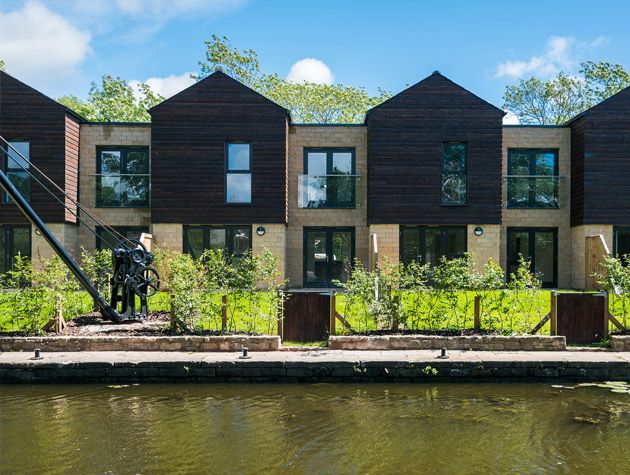Your options for self building your home
Explore choices from using a contractor, packaged company or tackling the building work yourself
We look at the different self build options – from using a main contractor to hiring a package company or tackling the building work yourself – to help you decide what will suit your needs.
The term self-build covers a wide spectrum of ways to create a new home. How involved you are in your project will depend on a variety of factors including your budget, skills and the time you have available – the experience is what you make of it.
You can be hands-on throughout or take a back seat and leave the stress to the professionals.
If you have some construction skills – you’re able to lay your own bricks, for example – then you’ll enjoy getting your hands dirty and will save money, too. But in the vast majority of cases, self-builders don’t have the time to spare or the skills necessary to undertake the whole build process on a DIY basis.
Many self-builders choose to take on the management of their project, while others will want the reassurance of a professional overseeing the work.
Some will take their architect’s design to a single main contractor to work on, or even work with a package company from conception to completion. All of these routes (and more) fall under the umbrella of self-build; you just need to select the system that best suits your circumstances.

Photo: Alison Hammond
Getting involved in your project
The truth is that most people who start a self-build do not have a background in construction. Nevertheless, there are many ways you can be involved in your project without having a specialist skill. Some people take great personal satisfaction from being physically involved in creating their home, while others do it to save money.
If you are a capable DIYer, taking on site preparation works, labouring on site for the builder and providing assistance for tradesmen as and when required should be well within your remit.
Alternatively, you can help your build progress from behind the scenes with site organisation and scheduling or even by doing the project management.
This is a well-trodden route and could save you 30-40 per cent on labour and materials if you are organised and have sufficient time to dedicate to it. Properly co-ordinating what and who is on site – and when – is key.
All trades must arrive on time, in the correct order and have the appropriate supplies to complete their jobs. Poor scheduling can lead to huge financial issues – if there are materials that contractors need at a specific time and they don’t have them, your build will lose momentum and you’ll still have to pay for the wasted time.
Taking on the project management means you have to be well prepared – you can learn many of the necessary skills by going on a specialist course. The National Self Build & Renovation Centre in Swindon runs regular project management day courses; these will teach you everything from budgeting and site set-up to sourcing and organising trades and materials.
If you are a self-build novice, the knowledge you’ll garner from a focused course will prove invaluable.

Photo: Anna Stathaki
Hiring the professionals
If you still want to oversee your build but feel that the skills and time of an industry professional would be money well spent, you should consider hiring a main contractor.
This could be a large national construction company or a small local builder and will enable you to deal with one firm for all of the work required for your new-build, rather than lots of separate individuals.
Your main contractor will source and employ subcontractors, based on the contacts they have in your area. This removes the worry of hiring tradespeople yourself and potentially employing someone whose work is sub-standard; many builders repeatedly work with the same teams of people, so they know their strengths and weaknesses and how best to manage them.
You can still take control of sourcing, scheduling and ordering materials if you so wish, or you can ask your contractor to do this on your behalf. The appeal of this is that you won’t have to worry about whether the various construction materials will be on site at the right time.
If you don’t feel you have the time or skills to manage any part of your scheme, employing a professional project manager could be the ideal solution. They will usually charge a set fee for their services, which can vary between 10 and 12 per cent of your overall build cost.
It will be their job to organise the project for you from start to finish and they will guide you through the whole process – in addition to co-ordinating the trades and material elements, they will also create a cost schedule from the outset and deal with essential elements such as warranties, certificates and planning or building inspectors.

Photo: Mike Black
Package companies
Instead of working with individual builders and tradesmen, another option is to create your new home with a package builder – a company that both designs and supplies your home. The benefit here is that you will have few of the worries felt by those who are self- procuring their scheme.
A package company can combine an architectural design service with providing all of the main materials needed to build the house for an agreed price – hence the package title. The company will make your house windproof and watertight as a minimum – at which point you will have a few options.
If you want a more hands-on approach to the finishing touches, or if you want to save some money, you can take over the project at this first-fix stage. You can then organise trades to help you, do some tasks yourself or work with a professional project manager to take the house all the way through to completion.
If you have the budget, selecting a turnkey option is the easiest, most hands-off way to reach completion – this simply means that once you have made your decisions at the design stage, the package company carries out all the work required, down to interior finishes such as painting and carpeting.
You then ‘turn the key’ to open the door to your finished new home. These schemes are perfect for anyone living far away from their project, those who don’t have the time to devote to taking on any work or who simply don’t feel confident in taking on the responsibilities involved.

Photo: dreamplot.net
Custom build
Relatively new to the UK, custom building is a route to creating a bespoke abode that’s very similar to self-building – it enables you to make a home that suits your needs, that you’ve helped to design and that’s more affordable than a similar home on the conventional market.
As with self-build, there is no one fixed way to complete a project. There are a variety of options, but the common feature is that you work with a developer or custom-build enabler.
For a developer-led custom-build project, you would buy a serviced plot of land from a developer, often within a community of similar builds, that’s been finished to a certain stage.
Depending on the project you choose, this could range from foundations in place, to shell ready, to windproof and watertight and so on. You would then get the chance to customise more detailed design elements before the house is completed by the developer.
On other sites, serviced plots with started projects are sold on the basis that buyers will have the choice to finish the build themselves or appoint their own contractors.
There will generally be restrictions in place, so the house will have to be finished within a certain time frame and the design will have to fit in with the site’s overall design code.
Whichever custom-build option you choose, the developer or site enabler will already have overcome many of the common hurdles faced by self-builders – the plot is secured, services are in place and planning permission is obtained.
‘This removes a lot of risk from the process for the potential homeowners,’ says Tom Connor of Custom Build Homes. ‘Some people are concerned that custom building with a developer means they won’t have control over the design and layout, but this shouldn’t be the case.
Obviously all custom-build sites are different, and each will have its own rules, but a good custom-build developer should be able to tailor the properties to suit individual owners’ needs.’
Custom build in Europe
Although new to the UK, custom building is hugely popular in Europe. In the Netherlands, for example, it is one of the most commonly used routes to new home ownership – and this is, in part, thanks to the scale of the developments that the Dutch government supports.
Almere, located in the province of Flevoland, is one of the fastest-growing cities in Europe. It’s built on council land as part of the city’s plans to provide affordable housing for low-income households.
By 2012, around 1,000 homes had been built, but eventually there will be some 3,000 on the site. The city is split into themed districts – for example, one area is for live/work houses, another for terraced homes and another is for canal-side dwellings.
One of the zones is set aside for housing developers who assemble collectives of people who want a block of apartments or a terrace, so that they can work together on a build to reduce costs.

Photo: NACSBA









